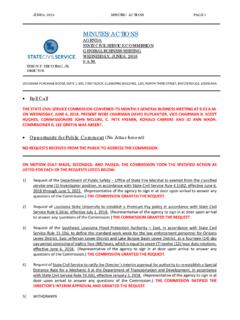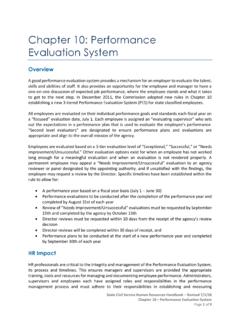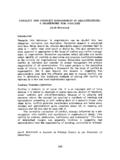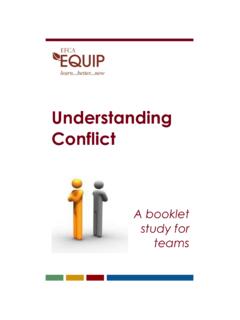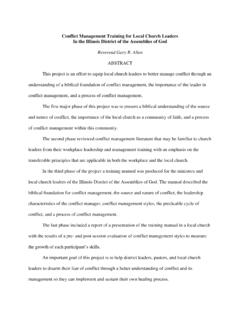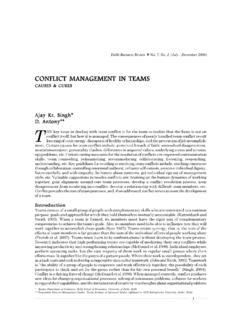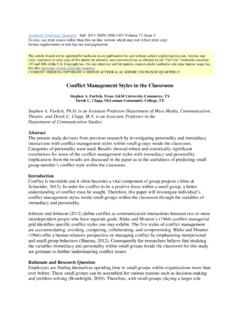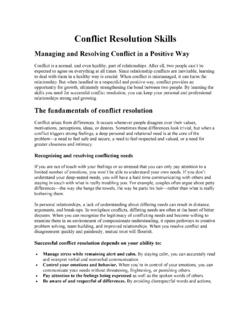Transcription of EFFECTIVE CONFLICT RESOLUTION STRATEGIES
1 Participant s Manual Comprehensive Public Training Program (CPTP) Sponsored by the Louisiana State Civil Service Office of Human Resource management | Louisiana State University |304 Thomas Boyd Hall Baton Rouge LA 70803|225-578-2280 | 225-578-9499 (F) | EFFECTIVE CONFLICT RESOLUTION STRATEGIES 2 3 EFFECTIVE CONFLICT RESOLUTION STRATEGIES Participant s Manual Comprehensive Public Training Program (CPTP) Sponsored by the Louisiana State Civil Service Office of Human Resource management Louisiana State University 304 Thomas Boyd Hall Baton Rouge, LA 70803 Phone: 225-578-2280 Fax: 225-578-9499 Revised 6/23/14 4 RESOLVING CONFLICT Course Description This class explores STRATEGIES for resolving or managing interpersonal CONFLICT in the workplace.
2 Participants will learn about the causes and effects of CONFLICT , evaluate the appropriate use of different CONFLICT management styles, and focus on the application of collaborative, win-win techniques. Job Outcomes Manages or resolves conflicts , con-frontations, and disagreements in a positive and constructive manner to minimize negative personal impact. Considers and responds appropriately to the needs, feelings, and capabili-ties of others; adjusts approaches to suit different people and situations. Deals effectively with pressure; maintains focus and intensity and remains optimistic and persistent, even under adversity. Recovers quickly from setbacks. Effectively balances personal and work life. Learning Objectives Analyze a CONFLICT situation to determine cause and effect. Analyze how a individual s CONFLICT management style influences the outcome of a CONFLICT situation.
3 Apply various STRATEGIES for man-aging and resolving interpersonal CONFLICT . 5 THE NATURE OF CONFLICT In small groups or with a partner, consider the following statements: CONFLICT is a contest CONFLICT is negative. Are either one of these two statements generally true or generally false? If one or both are generally true, explain your reasoning and give one or two examples. If one or both are generally false, explain that reasoning also, with one or two examples. 6 CONFLICT happens when you have a situation in which your concerns, desires, preferences, and/or goals differ from those of another person.
4 CONFLICT centers on the differences between two or more individuals ( as well as groups or organizations) and how they choose to handle those differences. It can be positive. CONFLICT is one of the more potent of human interactions. It can either facilitate growth or bring harm to the people involved. Perhaps because of it s potency, CONFLICT has become a loaded word, carrying many negative connotations. Many people consider CONFLICT to be negative, but it can actually be positive. CONFLICT is positive when it is used to solve a problem. It can also help enhance one s strengths, clarify your purpose and encourage action. It s inevitable. CONFLICT is a daily reality. Whether at home or at work, our needs and values come into opposition with those of others. Some conflicts are minor, easy to handle, or can be overlooked. But some require a carefully thought out strategy for successful RESOLUTION to avoid lasting enmity.
5 So, the question is not IF there will be CONFLICT , but rather how to handle situations WHEN there is a CONFLICT . It is skill-based. The good news is that you can improve your ability to resolve conflicts ; it just takes practice and an understanding of common CONFLICT preferences and styles. Each person has a different style of dealing with CONFLICT . As you will see later on in the course, all styles are appropriate to use at various times. THE NATURE OF CONFLICT If you re the boss and your people fight openly when they think you re wrong, that s healthy. If your people fight each other openly in your presence for what they believe in, that s healthy. But keep all CONFLICT eyeball to eyeball. - Robert Townsend, An American business writer 7 Flight or Fight Response Why is it so hard to manage our reaction or control our emotions in a CONFLICT ?
6 Our responses are programmed in our DNA. We all have a flight or fight response to perceived _____ or _____. It is a primitive response which has helped to preserve and protect humans from the time of caveman. Our Physical Reaction _____ and other chemicals are activated, and then the _____ symptoms appear. Our sympathetic nervous system is engaged and we have a increase in _____ _____ and strength in our _____ _____. This is crucial for preparation for flight or fight because it pumps blood more rapidly to the needed areas of the body. The vital areas the blood is sent to the _____ (fight) and _____(flight). It can make us feel like we are choking, smothering, dizzy lightheaded, having heart attack, tightness in the chest. It is normal for individuals under stress and anxiety to report a loss of _____and trouble concentrating.
7 FLIGHT OR FIGHT RESPONSE Why do some individuals experience the sensation of cold, clammy hands and tingling sensations in their feet and toes? Why do some individuals experience an increase in sweating when their under stress or anxiety? WORD BANK Biceps Thighs Physical Adrenaline Threat Danger Memory Heart rate Heart beat 8 POSITIVE AND NEGATIVE EFFECTS Identify a workplace CONFLICT that you were personally involved with and were not pleased with the outcome. The situation you use for this exercise should be a one-on-one example not you vs. a group or organization. The situation should be from an actual experience, not a hypothetical story. Individually respond to the following questions: What did you do to contribute to the CONFLICT ?
8 From your point of view, what is the worst part of what happened? If you had to do it over again, what, if anything would you do differently? Now, in your group or with a partner, explain your situation by telling them the story of this CONFLICT , but only tell them what happened, not who or where it happened. Just tell them the story, rather than share the answers to the questions. Later on, each group will use one situation from each table for a different exercise. 9 When CONFLICT remains unresolved in the workplace, it can negatively affect employee performance and productivity. Employees may exhibit some of the following symptoms: What are the benefits of EFFECTIVE CONFLICT management ? Discuss the impact of appropriate CONFLICT management on the people and productivity at the work unit level.
9 UNRESOLVED CONFLICT Self doubt Higher stress Inflexibility Irritability Low productivity Disorganization Suspicion Poor teamwork Indecision 10 In order to effectively resolve CONFLICT it is helpful to first identify the source of the CONFLICT . There are many sources or causes of CONFLICT in the workplace. Some of the categories included are: Different Perceptions Opinions Personalities Communication Styles Values Backgrounds Interests Wants, needs, preferences or goals SOURCES OF CONFLICT Making assumptions Judging others Biases and prejudices Inaccurate or incomplete information Past Relationships Job Dissatisfaction As a group, pick one of your team members situations to work on.
10 Which of the causes that we just talked about probably led to the CONFLICT in the scenario chosen by your group? 11 Our Choice It s important to understand that we all have choice in how we react to CONFLICT . A situation happens that sparks a reaction that leads to .. A choice that leads to either an escalation or a RESOLUTION . The key is to learn how to manage our reaction so that we can focus on the choice. THE CONFLICT PROCESS 12 As illustrated in the M&M game, everybody has their own individual preference for dealing with CONFLICT . Some of us prefer to avoid CONFLICT at all costs, others see CONFLICT as a way to get their own way.






